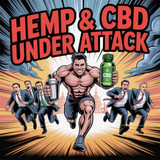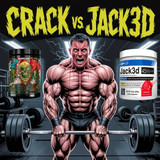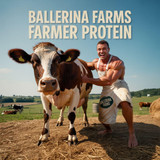Vitamins & Supplements to Balance Female Hormones Naturally
Female Hormonal Balance
Hormones play an important role in women's health affecting everything from mood and energy levels to metabolism and reproductive health. When hormones become unbalanced it can lead to symptoms like fatigue, mood swings, irregular cycles and even fertility challenges. In today's post we're going to discuss common causes of hormonal imbalance in women as well as some key vitamins, nutrients and supplements which may help to balance hormones naturally.
Common Causes of Hormonal Imbalance in Women
Hormonal imbalances can be triggered by a variety of factors which can include...
Stress: Chronic stress can increase cortisol levels which in turn can disrupt the balance of sex hormones.
Diet: Poor nutrition can affect hormone production.
Age: Hormonal changes occur naturally during perimenopause and menopause.
Lifestyle: Lack of exercise, poor sleep, and exposure to environmental toxins can contribute to hormonal issues.
Medical Conditions: Conditions like PCOS, thyroid disorders and diabetes are also common causes of hormonal disruption in women.
Thankfully there are certain vitamins and nutrients which may be helpful in restoring balance and overall hormonal health, we'll discuss them below.
Vitamins & Minerals to Balance Female Hormones
1. Vitamin D: The Sunshine Vitamin
Vitamin D acts similarly to a hormone in the body and plays a crucial role in regulating estrogen and progesterone. Vitamin D deficiency is associated with an increased risk of conditions like PCOS and thyroid disorders, both of which affect hormonal balance.
How to get it:
- Foods: Fatty fish, fortified milk, egg yolks.
- Supplement: Vitamin D3 is more effective than D2 for raising blood levels.
- Sunlight: Regular sun exposure (10-30 minutes a few times per week) can boost vitamin D naturally.
2. Vitamin B6: The Hormone Regulator
Vitamin B6 is involved in producing progesterone and serotonin, which play a role in mood and sleep. It’s particularly effective for managing PMS symptoms like bloating, irritability, and mood swings. B6 also supports the adrenal glands, helping to manage stress.
How to get it:
- Foods: Chickpeas, bananas, poultry, and potatoes.
- Supplement: B6 is often included in B-complex supplements for additional benefits.
3. Vitamin E: The Antioxidant Powerhouse
Vitamin E helps regulate estrogen levels and is known for easing symptoms related to PMS and menopause, such as hot flashes and night sweats. As an antioxidant, it also protects cells from oxidative damage, which can contribute to hormonal imbalances.
How to get it:
- Foods: Nuts, seeds, spinach, and avocados.
- Supplement: Choose natural vitamin E (d-alpha-tocopherol) for better absorption.
4. Vitamin C: Immune and Adrenal Support
Vitamin C supports the adrenal glands, which produce cortisol to manage stress. High cortisol levels can negatively impact sex hormones, but vitamin C helps regulate this balance. It also promotes healthy ovulation and aids in the absorption of iron, an important nutrient for women with heavy menstrual cycles.
How to get it:
- Foods: Citrus fruits, strawberries, bell peppers, and broccoli.
- Supplement: A time-release vitamin C supplement ensures longer absorption throughout the day.
5. Vitamin A: Supporting Estrogen Balance
Vitamin A is essential for producing estrogen and also supports the liver in detoxifying excess estrogen. This helps maintain hormone balance, particularly in women with estrogen dominance, which can cause weight gain and irregular periods.
How to get it:
- Foods: Carrots, sweet potatoes, kale, and liver.
- Supplement: Beta-carotene (plant-based) or retinol (from animal sources) are good options for supplementation.
6. Vitamin K2: Bone and Hormone Health
Vitamin K2 works with vitamin D to regulate calcium, supporting bone health and estrogen balance. It's especially important for post-menopausal women who are at risk of osteoporosis and need extra support for their hormonal health.
How to get it:
- Foods: Fermented foods like sauerkraut and natto, as well as dairy products and egg yolks.
- Supplement: Vitamin K2 is often paired with vitamin D3 for maximum benefits.
7. DIM (Diindolylmethane): A Natural Estrogen Regulator
DIM is a powerful compound found in cruciferous vegetables like broccoli and cauliflower. It helps metabolize estrogen into less harmful forms, reducing the risk of estrogen dominance—a condition linked to symptoms like mood swings, bloating, and irregular cycles. DIM can also promote hormonal balance during perimenopause and menopause by helping the body eliminate excess estrogen.
How to get it:
- Foods: Cruciferous vegetables (broccoli, cauliflower, cabbage, kale).
- Supplement: DIM supplements are available for more concentrated benefits, especially for those with estrogen dominance concerns.
How to Incorporate These Vitamins & Nutrients Into Your Daily Routine
Whether you're a bodybuilder, an athlete or a women looking to balance your hormones, getting as much of your nutrition from real whole foods is ideal, there's a reason it's called supplementation. That said it can be challenging to do and that's where supplementation comes in to fill the gaps. Consider a multivitamin tailored for women's health or specific supplements for key vitamins like Vitamin D, B6, or DIM.
In addition to Vitamins and Supplements adopting a healthy lifestyle that includes reducing stress levels, getting enough sleep, exercising regularly and eating a balanced diet can further enhance the effects of these vitamins and supplements.
Conclusion
Achieving hormonal balance is important for a women's overall wellbeing. With the right combination of Vitamins like D, B6, E, C, A, and K2 along with the estrogen balancing effects of DIM you can naturally support your body's hormone regulation. As with any supplement be sure to consult a healthcare provider before starting any new supplementation regimen to ensure it's suitable for your needs.
†The content of this blog post is intended solely for reference and entertainment purposes. We do not offer medical advice or specific guidance regarding the products discussed. Our insights are based on a combination of anecdotal experiences, online studies/reviews, manufacturer details, and customer feedback. While we strive to present accurate and current information, we cannot assure its completeness or its alignment with the most recent product formulations or data. For any concerns or up-to-date information, we recommend visiting the manufacturer's website directly. The opinions and information provided here do not necessarily reflect the views of Best Price Nutrition; they represent the perspectives and information from the manufacturers and users. Furthermore, these statements have not been evaluated by the Food and Drug Administration. The products mentioned are not intended to diagnose, treat, cure, or prevent any disease or illness.
Recent Posts
-
Hemp Products Under Fire: What the New Hemp Ban Law Means for CBD & Supplements
The Recent Hemp Ban If you're in the fitness or supplement game, or just if you're a consumer who en
-
Crack vs. JACK3D Battle of High Stim Preworkouts
Crack Vs. JACK3D Which is the King of Preworkouts? Preworkouts have come a long way since the days o
-
Ballerina Farms Farmer Protein Review: From Their Barn to Your Blender
Ballerina Farms Farmer Protein Powder Review If you spend any amount of time on social media you've





